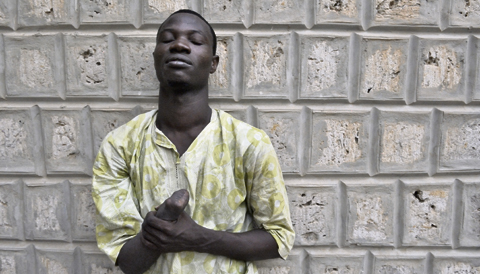December 13 | ![]() 0 COMMENTS
0 COMMENTS ![]() print
print

People of faith are living in fear
JOHN NEWTON, press officer for AID TO THE CHURCH IN NEED, explains how the persecution of Christians, and the human rights situation in general, is worsening in many countries throughout the world
A Christian man was crucified by a jihadist group which took control of Yemen’s southerly province of Abyan. Footage was put up on Youtube showing the man crucified on an electric pylon. His bloated corpse showed that the body had been there for several days in the hot middle-eastern sun. A sign above his head stated that those ‘who wage war’ against Allah and the Prophet Mohammed ‘shall be killed or crucified.’
Aid to the Church in Need’s new Persecuted and Forgotten? report reveals how in many parts of the world Christians are experiencing growing oppression. Looking at the situation in 30 countries, we found the situation had worsened in 20 of them due to a number of factors: crack downs on believers in Communist—and post-Communist—societies, growing intolerance to minority religions from nationalist groups, increasing difficulties driving Christians out of the Middle East, and an increased surge in militant Islamist groups targeting those who do not share their beliefs.
The Christian in Yemen who was killed at the end of last year, after being accused of spying for the west, is only one example of Christians being targeted by Islamist extremists. Militant Islamists groups—who believe Islam should be imposed on society, including the partial or full introduction of shari‘a law—have used terrorist tactics to try to impose their religious vision on several countries. In Nigeria attacks on church buildings and Christian homes have risen, and since 2007 more than 700 churches had been attacked, mostly by extremists from the north wanting to impose shari’a across the country. While in northern Mali a ferocious military campaign backed by al-Qaeda drove 200,000 Christians from northern Mali to neighbouring Algeria and Mauritania.
While generally it is independent groups who drive this agenda forwards, in some places a fundamentalist government have imposed a hard-line vision of Islam on all its inhabitants. In the Maldives, where the constitution denies citizenship to non-Muslims and prohibits all laws contrary to any ‘tenet of Islam,’ there have been calls for the full implementation of shari’a. Christians have been targeted and killed by extremists in Yemen where President Ali Abdullah Saleh declared Islam to be the ‘state religion and shari’a as the source of all legislation.’ Similarly in Sudan churches have been attacked, clergy arrested, and lay people detained without charge since its president announced the Islamification of the country.
Yet we should not fall into the trap of thinking these radical groups and governments are in any way characteristic of Islam—they are not. Not only do most Muslims in many of the countries mentioned above want to live side-by-side in peace with their neighbours, but in some places where both Muslims and Christians are in the minority, they too are targeted because of their religious beliefs. In both Sri Lanka and Burma attempts to impose the majority faith Buddhism by attacks on those who practice other creeds and in both countries religion and ethnicity are seen as entwined to a greater or lesser degree.
Sri Lanka saw at least 45 incidences of persecution against Christians recorded in the first five months of 2013, compared to only 52 incidents against churches recorded throughout the whole of 2012. While in Burma the ongoing repression of religio-ethnic groups in the northern tribal areas continues, despite significant political reforms in the country. Reports state that government troops are still trying to bring areas such as Kachin and Rakhine state under control by force and soldiers are pressuring those who live there to convert to Buddhism. Hkanhpa Sadan, joint secretary of the Kachin National Organisation reported: “When the Burma Army come to the villages, they torch the churches but don’t touch the pagodas. They want us to be Burman, to be Buddhist, and to follow their orders.”
In some states families encouraged to convert by financial and other incentives including exemption from forced labour, which the army imposes on many of the natives. While Christians continue to experience problems it must be noted that during the two-and-half year period we examined the most extreme religious persecution in Burma has been against the Rohingya Muslim minority in Rakhine state, where since June 2012 more than 5000 have been killed.
But religion is not always a factor and major restrictions on Christians continue in both Communist countries and a number of former Marxist states.
In Belarus, Turkmenistan and Uzbekistan restrictions on religion linger on, and the Communist governments of China and Vietnam still impose serious restraints and grave hardships on Christians. But persecution is probably worst in North Korea. Prisoners who have escaped the country have described how those caught praying or owning Bibles can be imprisonment in North Korea’s interment camps, and it has been suggested that at least 25 per cent of Christians are interned in labour camps. In these gulags prisoners face inhuman conditions including forced labour, routine beatings, torture, and even arbitrary execution.
Religious liberty is the cornerstone of freedom as a whole. As Blessed Pope John Paul II said, it is ‘the litmus test for the respect of all other human rights.’ Where Christians are being persecuted members of other religions also suffer and other rights are impinged and repressed. While the Persecuted and Forgotten? report shows the persecution of Christians worsening in many countries—which is shocking in itself—this is frequently symptomatic of a worsening human rights situation. That inhumane punishments are meted out to Christians in places like North Korea, is a symptom of a system that sanctions such degrading punishments for prisoners whose only crime is dissenting from the totalitarian system.
Let us pray and work for everyone to be able to worship in freedom and express their faith—whatever that faith may be—without fear of retribution. And let us do all we can to help our Christian brothers and sisters when their churches are attacked, their basic human rights taken away, or they are reviled and persecuted because of their belief that Jesus is the incarnate Son of God.
n Dr Newton co-authored Aid to the Church in Need’s Persecuted and Forgotten? report, which examines at the oppression of Christians. It describes numerous incidents of persecution, two of which are given on these pages. To read the full report please visit www.acnuk.org/persecution











